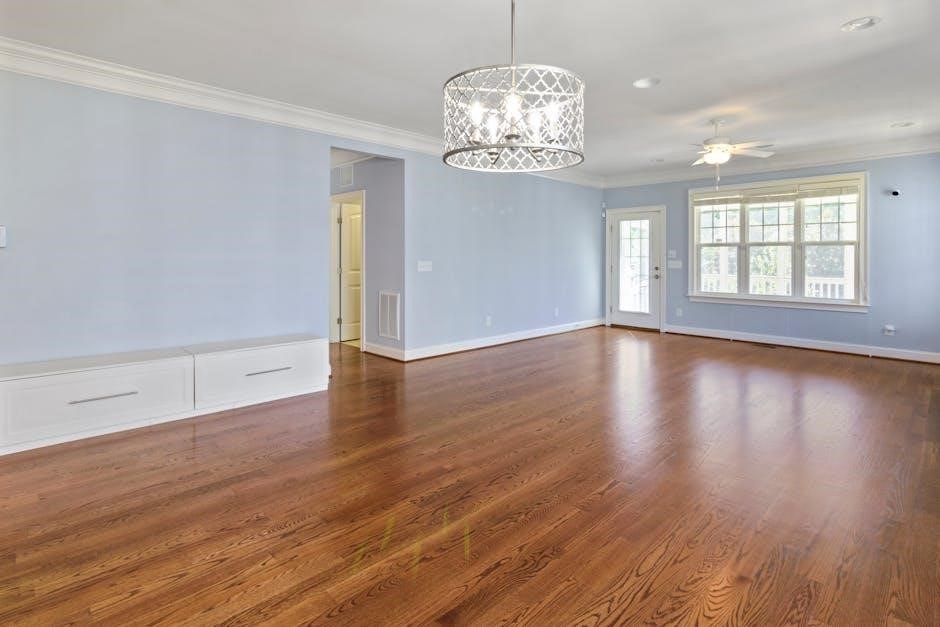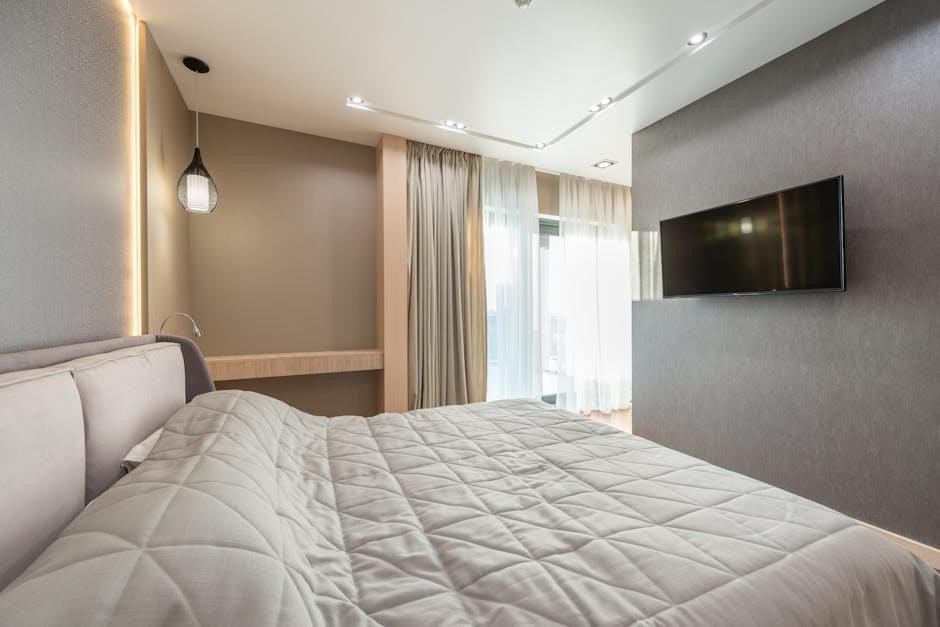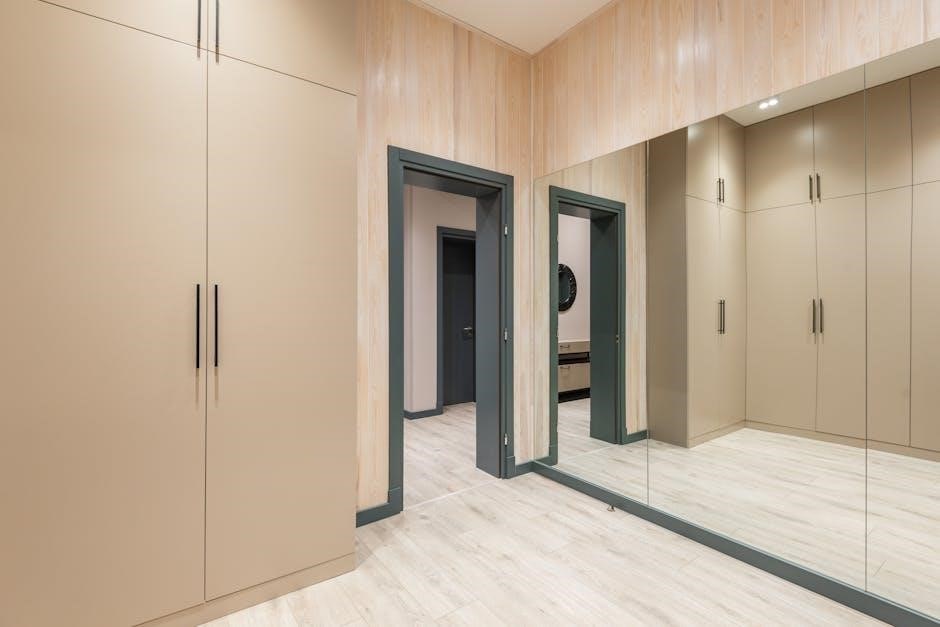
house rules for tenants renting a room pdf
Essential guide for tenants renting a room. Download our free PDF to understand house rules and responsibilities. Perfect for landlords and tenants!
House rules are essential for maintaining order and respect in shared living spaces. They outline expectations for tenant behavior, ensuring a harmonious and smooth rental experience for all parties involved.
1.1 Importance of Establishing House Rules
Establishing house rules is crucial for maintaining a harmonious and respectful living environment. They protect the property, prevent disputes, and ensure all tenants adhere to shared expectations. Clear rules foster accountability, safety, and mutual respect, benefiting both tenants and landlords. They also provide legal clarity, ensuring compliance with local laws and tenant rights, while safeguarding the property from potential damage or misuse.
1.2 Purpose of a Room Rental Agreement
A room rental agreement outlines the terms and responsibilities for tenants and landlords, ensuring clarity on rent, utilities, and house rules. It serves as a legally binding document that protects both parties by defining expectations and obligations. This agreement helps prevent disputes, ensures compliance with local laws, and provides a structured framework for resolving issues, fostering a fair and respectful rental relationship.

Legal Considerations for House Rules
House rules must comply with local, state, and federal laws, ensuring they do not violate tenant rights or fair housing laws to avoid legal disputes and ensure fairness.
2.1 Compliance with Local, State, and Federal Laws
Ensuring house rules comply with local, state, and federal laws is crucial to avoid legal disputes. Rules must not infringe on tenant rights or fair housing laws, maintaining fairness and legality. Landlords should consult legal professionals to draft rules that align with all applicable regulations, preventing potential conflicts and ensuring a legally sound rental agreement for all parties involved.
2.2 Tenant Rights and Fair Housing Laws
House rules must respect tenant rights and comply with fair housing laws to prevent discrimination. Rules should not unfairly target specific groups or infringe on tenants’ legal protections. Landlords must ensure that all policies are applied consistently and do not violate anti-discrimination laws. Tenants have the right to fair treatment and equal access to housing under federal and state regulations.
Common House Rules for Tenants
Common house rules address noise levels, cleanliness, safety, and guest policies to maintain a respectful and orderly living environment for all tenants and property owners.
3.1 Noise Levels and Quiet Hours
Noise levels must be kept reasonable, especially during designated quiet hours, typically late at night and early in the morning. Tenants are expected to refrain from loud gatherings, musical instruments, or excessive noise that may disturb others. Persistent violations of noise rules can lead to penalties or lease termination, ensuring a peaceful environment for all occupants.
3.2 Cleanliness and Maintenance Responsibilities
Tenants must maintain a clean and hygienic living environment, including shared spaces like kitchens and bathrooms. Regular cleaning schedules may be implemented to ensure fairness. Tenants are responsible for reporting maintenance issues promptly to prevent property damage. Neglecting these duties can result in penalties, emphasizing the importance of shared accountability for the property’s upkeep and overall condition.
3.3 Safety Precautions and Emergency Procedures
Tenants must adhere to safety guidelines to prevent hazards. This includes proper use of electrical appliances and reporting potential risks. Emergency procedures, such as evacuation routes and fire extinguisher locations, must be understood. Regular drills may be conducted to ensure preparedness. Failure to comply can lead to penalties, highlighting the critical role of safety in protecting both tenants and property.
3.4 Guest Policies and Overnight Stays
Guest policies are crucial to maintain privacy and security. Tenants must notify the landlord or roommates before inviting guests. Overnight stays may require prior approval, with limits on frequency and duration. Unauthorized long-term guests can be considered violations, leading to penalties or lease termination. Clear communication ensures respect for shared spaces and fosters a harmonious living environment for all parties involved.

Lease Agreement and House Rules
A lease agreement should outline house rules clearly, ensuring both tenants and landlords understand their responsibilities and the consequences of non-compliance, fostering a balanced and respectful relationship.
4.1 Incorporating House Rules into the Lease
Incorporating house rules into the lease ensures clarity and legal enforceability. This section outlines how to integrate these rules, making them binding for tenants. Clear communication of expectations helps prevent disputes and ensures compliance, while also protecting the landlord’s property. Proper documentation is key to maintaining a harmonious rental relationship.
4.2 Consequences of Non-Compliance
Non-compliance with house rules can lead to penalties, lease termination, or eviction. Tenants must be informed of these consequences in the lease agreement. Failure to adhere to rules may result in warnings, fines, or legal action. Landlords must ensure penalties are fair and comply with local laws to avoid disputes. Clear enforcement of rules protects both the property and the landlord-tenant relationship.

Roommate Agreements and Shared Spaces
Roommate agreements outline responsibilities for shared areas, promoting harmony and accountability. They ensure cleanliness, fair resource use, and respect for common spaces, fostering a positive living environment.
5.1 Division of Responsibilities
Dividing responsibilities clearly ensures harmony among roommates. Tasks like chores, utility bills, and shared space maintenance should be fairly allocated. House rules should outline each tenant’s duties to prevent disputes. Regular discussions can help adjust these divisions as needed, fostering accountability and mutual respect. Clear agreements on responsibilities promote a balanced and peaceful living environment for all tenants.
5.2 Shared Spaces Usage and Clean-Up
Shared spaces, such as kitchens and bathrooms, require mutual respect and maintenance. House rules should specify how these areas are to be used and cleaned. Tenants must take turns or divide responsibilities to ensure cleanliness. Failure to uphold these standards may result in penalties. Clear guidelines help maintain hygiene and foster a positive living environment for all tenants.
Enforcement of House Rules
Enforcing house rules ensures compliance through regular inspections, documented penalties, and clear communication. Non-compliance can lead to lease termination, protecting the property and maintaining order.
6.1 Landlord’s Right to Inspect the Property
Landlords have the legal right to inspect the property to ensure compliance with house rules and maintain its condition. Inspections must be conducted with proper notice, except in emergencies. This ensures tenant privacy while allowing landlords to address potential issues promptly. Regular inspections help prevent damages and rule violations, fostering a safe and respectful living environment for all tenants.
6.2 Penalties for Violating Rules
Violating house rules can result in penalties, such as fines or lease termination. Landlords may impose these consequences to enforce compliance and protect the property. Penalties must align with legal standards to avoid disputes. Repeat offenses can lead to eviction, ensuring accountability and maintaining a respectful living environment. Clear communication of penalties in the lease agreement is essential for fairness and transparency.
Customizing House Rules for Specific Properties
Customizing house rules allows landlords to tailor guidelines for specific properties, ensuring they meet unique needs while remaining fair and compliant with local laws.
7.1 Tailoring Rules for Different Types of Rentals
House rules should be adapted to fit the specific type of rental property, such as shared rooms, entire homes, or vacation rentals. For shared spaces, emphasize cleanliness and quiet hours, while for vacation rentals, focus on guest limits and check-in procedures. Ensuring rules align with the property’s unique characteristics helps maintain order and tenant satisfaction. Clear guidelines prevent misunderstandings and foster a respectful environment. Regular updates may be necessary to address changing needs or local regulations. By tailoring rules, landlords can create a framework that suits their property and tenant lifestyle, promoting harmony and compliance.
7.2 Updating Rules as Needed
House rules should be reviewed and updated periodically to reflect changing circumstances, such as new laws, tenant feedback, or property-specific needs. Regular updates ensure the rules remain relevant and effective. Involving tenants in the revision process fosters cooperation and understanding. Any changes must be communicated clearly and documented to maintain compliance and fairness, ensuring a balanced and harmonious living environment for all parties involved.
House Rules Templates and PDF Downloads
Download customizable house rules templates in PDF format to establish clear guidelines for tenants. These templates cover essential aspects like noise levels, cleanliness, and safety precautions, ensuring compliance and harmony.
8.1 Where to Find Reliable Templates
Reliable house rules templates can be found on websites like guardianprop.com, offering customizable PDFs for room rentals. Legal document platforms also provide state-specific templates. These resources ensure compliance with local laws and cover key areas like noise levels and guest policies. Customize templates to suit your property needs and consult a legal expert to ensure enforceability.
8.2 How to Modify Templates for Your Needs
Download a house rules template and tailor it to your property by adding specific rules, such as noise restrictions or guest policies. Use editing software to customize sections, ensuring clarity and enforceability. Include a signature section for tenant agreement and consult a legal expert to verify compliance with local laws. This ensures the document meets your unique needs while remaining legally sound.
Managing Tenant Expectations
Clear communication of house rules ensures tenants understand their responsibilities, fostering mutual respect and a positive living environment. This approach minimizes disputes and promotes harmony among all parties involved.
9.1 Clear Communication of Rules
Clear communication of house rules is crucial for ensuring tenants understand their responsibilities. Discussing rules during lease signing and providing a written copy helps prevent misunderstandings. Being approachable for questions fosters trust and ensures compliance. Open dialogue from the start sets the tone for a respectful and harmonious living environment, benefiting both tenants and landlords.
Examples include noise levels, guest policies, and maintenance duties. Transparent communication ensures everyone is on the same page, reducing potential conflicts and promoting mutual understanding.
9.2 Addressing Tenant Concerns
Addressing tenant concerns promptly is vital for maintaining a positive relationship. Encourage open communication and listen actively to their issues. Providing clear solutions or explanations helps resolve conflicts quickly. Being responsive shows respect for tenants’ needs, fostering trust and cooperation. Regular check-ins can also help identify and address concerns before they escalate.
Documenting issues and resolutions ensures transparency and accountability, benefiting both parties.

Promoting a Harmonious Living Environment
House rules play a key role in fostering a peaceful and respectful atmosphere among tenants. By clearly defining expectations and responsibilities, they help minimize conflicts and ensure a pleasant living experience for everyone involved.
10.1 Respectful Behavior Guidelines
Respectful behavior is the cornerstone of a harmonious living environment. Tenants should communicate openly, respect shared spaces, and maintain reasonable noise levels. Cleanliness and punctuality in shared areas foster mutual respect. Personal boundaries and privacy must be honored to ensure a considerate community. These guidelines promote a culture of kindness, ensuring all tenants feel valued and comfortable in their home.
10.2 Conflict Resolution Strategies
Conflict resolution strategies are crucial for addressing disputes between tenants and landlords or roommates. Open communication, active listening, and seeking mutually beneficial solutions can resolve issues amicably. If conflicts persist, involving a neutral mediator or documenting concerns formally can help. These approaches ensure harmony, prevent escalation, and maintain a positive living environment for everyone involved, fostering long-term stability and respect.
Digital Management of House Rules
Digital management of house rules involves using online platforms for agreement storage, e-signatures, and real-time updates. This ensures accessibility and compliance, streamlining communication between landlords and tenants.
11.1 Using Online Platforms for Agreement Management
Online platforms simplify house rule management by digitizing agreements and enabling e-signatures. Tools like property management software allow landlords to store, share, and update rules securely. Tenants can access documents anytime, ensuring clarity and compliance. Automated reminders for rule updates and renewals enhance efficiency, fostering better communication and adherence to guidelines. This modern approach streamlines management, reducing disputes and promoting a harmonious rental environment.
11.2 E-Signatures and Digital Storage
E-signatures and digital storage streamline the management of house rules and rental agreements. Tenants and landlords can securely sign and store documents online, eliminating paperwork. Digital platforms ensure easy access, organization, and updates, while maintaining a record of compliance. This method enhances efficiency, transparency, and legal integrity, making it a modern solution for effective agreement management in rental properties.
House rules are vital for fostering harmony and accountability in rental spaces. They provide clarity, outline expectations, and protect both tenants and landlords, ensuring a smooth living experience.
12.1 Final Thoughts on Effective House Rules
Effective house rules are crucial for maintaining harmony and accountability in rental spaces. They provide clarity, outline expectations, and protect both tenants and landlords, ensuring a smooth living experience. By establishing clear guidelines, landlords can promote respect, safety, and compliance, fostering a positive environment for everyone involved. Regular updates and open communication further enhance their effectiveness. A well-structured set of rules ensures lasting benefits for all parties.